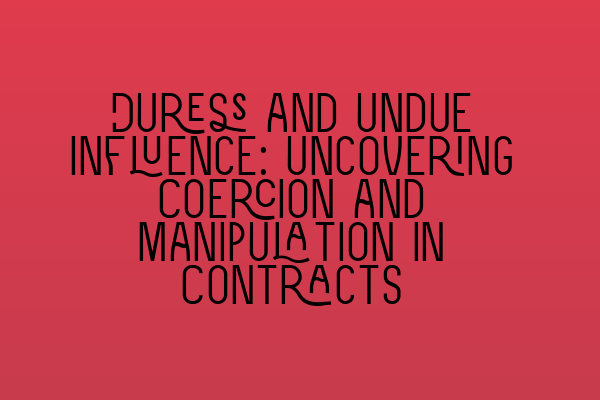Duress and Undue Influence: Uncovering Coercion and Manipulation in Contracts
In the world of contract law, there are certain situations where one party may be coerced or manipulated into entering into an agreement against their will. These situations involve duress and undue influence, two concepts that are important to understand in order to protect your rights and interests in contractual agreements.
Duress refers to the use of threats, violence, or other forms of pressure to force someone to enter into a contract. It is the epitome of an unfair advantage, where one party takes advantage of the vulnerability of another. Duress can take many forms, such as physical harm, blackmail, or economic pressure. It is important to note that for a contract to be considered duress, the pressure applied must be so severe that it would lead a reasonable person to believe they have no other choice but to enter into the agreement.
Undue influence, on the other hand, occurs when one party exerts a level of influence or control over another, leading to the unfair formation of a contract. This usually happens when the relationship between the parties is one of trust, such as a parent-child relationship or between close friends. The party exerting the influence takes advantage of their position to manipulate the other party’s decision-making process, ensuring that the contract serves their own interests rather than those of the other party.
It is important to understand that duress and undue influence are considered legal defenses against the enforcement of a contract. If you find yourself in a situation where you believe you have been coerced or manipulated into entering into a contract, it is essential to consult with a solicitor familiar with contract law and specializes in this area.
When faced with a case involving duress or undue influence, a skilled solicitor will analyze the circumstances surrounding the formation of the contract. They will consider factors such as the relationship between the parties, the nature of the pressure or influence applied, and the impact it had on the party being coerced or manipulated. The solicitor will gather evidence, interview witnesses, and present a compelling case to demonstrate that the contract should be voided due to duress or undue influence.
Proving duress or undue influence can be challenging, as the burden of proof lies with the party seeking relief from the contract. However, with the guidance of a qualified solicitor, you can navigate through the complexities of the law and protect your rights.
In order to prevent situations involving duress or undue influence, it is crucial to be aware of the signs and take precautions when entering into any contractual arrangement. Here are a few tips to safeguard yourself:
1. Be cautious of high-pressure tactics: If the other party is pressuring you to sign a contract without giving you ample time to review, seek legal advice, or negotiate terms, it might be a red flag.
2. Seek legal advice: Before signing any important contracts, it is always wise to consult with a solicitor who specializes in contract law. They can review the agreement, identify any potential risks, and ensure that your rights are protected.
3. Keep records: Maintain a written record of all communications, negotiations, and any instances where you feel coerced or manipulated. These records can be valuable evidence if you need to challenge the validity of a contract in the future.
4. Understand the terms and implications: Take the time to thoroughly read and understand the terms of the contract before signing. If there are any terms that are unclear or seem unfair, seek clarification or negotiate them before proceeding.
By taking these proactive steps, you can minimize the risk of falling victim to duress or undue influence. Remember, prevention is often the best defense when it comes to protecting your rights and ensuring fair contractual agreements.
In conclusion, duress and undue influence are serious issues that can have far-reaching consequences in contract law. If you believe you have been coerced or manipulated into entering into a contract, it is essential to consult with a skilled solicitor who can guide you through the legal process and ensure that your rights are protected. By being proactive and aware, you can safeguard yourself from entering into unfair agreements and preserve the integrity of contract law.
Related Articles:
SQE 1 Practice Exam Questions
SQE 1 Practice Mocks FLK1 FLK2
SQE 2 Preparation Courses
SQE 1 Preparation Courses
SRA SQE Exam Dates
